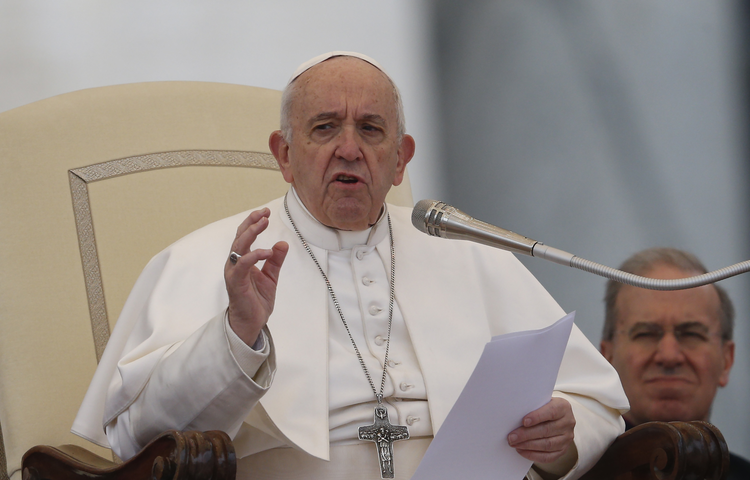Pope Francis issues new rules for accountability and response to allegations of sexual abuse
Pope Francis today issued a wide-ranging decree, known as a motu proprio or executive decree, that lays down procedures and norms for reporting abuse in the church, aimed at the eradication of abuse in the church.
It obliges bishops in every diocese to establish, by June 2020, a system that is accessible to the public for the reporting of any of the following: the sexual abuse of minors or vulnerable adults; the use of violence or intimidation (whether with minors or adults) to engage in sexual acts; the possession or distribution of child pornography; and the cover-up of such conduct by bishops or religious superiors.
It leaves it up to the individual dioceses to decide what kind of system that diocese deems best for the task, but it requires the diocese to inform the papal representative of the system it has established. The pope’s motu proprio is a follow-up to the February meeting of the presidents of the bishops’ conference on the protection of minors and draws on the norms approved by the pope for the Vatican City State on March 29.
Cardinal Marc Ouellet, the prefect of the Congregation for Bishops, in a Vatican news interview said that the reference in the motu proprio to the harassment or violence or intimidation by abuse of authority “includes the cases of abuse of women religious by clerics, or the abuse of seminarians or novices by their superiors.”
The motu proprio imposes a universal and legally binding obligation on all clerics and religious (both men and women) to immediately report all accusations of abuse or the cover-up of abuse. Hitherto, it was left up to the conscience of individuals to do so.
It makes clear that this obligation does not dispense with any obligation that may exist under state or civil law to report the abuse to the authorities in whatever country the abuse occurs in.
The motu proprio introduces clear procedures for holding those in leadership positions in the church accountable, including bishops or religious superiors, for abuse or cover up and describes in some detail how this is done, and it explains the role of the metropolitan in this process and that of the relevant Vatican congregations, starting with the Congregation for the Doctrine of the Faith. If the accused is a bishop, the metropolitan receives a mandate from the Holy See to investigate. A metropolitan see, headed by a “metropolitan” archbishop, is the chief episcopal see of an ecclesiastical province, comprising neighboring dioceses.
The motu proprio “makes clear that there is no longer impunity in the church….No one in the leadership is above the law,” Archbishop Charles Scicluna told a press briefing in the Vatican after the publication of the text.
The motu proprio insists that the Vatican offices must give timely responses to the metropolitan or other person responsible for a case. It envisages the possibility for the involvement of qualified lay persons in this work. The metropolitan must provide a report every 30 days to the Vatican.
The motu proprio decrees the protection of victims and all those who report abuse from “prejudice, retaliation or discrimination.” In Article Four, it states that “an obligation to keep silent may not be imposed on any person with regard to the contents of his or her report.”
According to Article Five, church authorities must ensure that “that those who state they have been harmed, together with their families, are to be treated with dignity and respect,” welcomed and listened to and provided with spiritual, medical and other assistance that they may require.
It also decrees the duty of the bishop or religious superior, or others with responsibility, to ensure the protection of all documentation relating to reports of abuse. It sets time limits for the opening and completing of an investigation, 30 and 90 days, respectively, and outlines the process leaders should follow once an investigation is complete. The motu proprio says the victim is to be informed regarding the development of his or her case.
It insists on the presumption of innocence for the accused until the case against him or her is proven and emphasizes the importance of “confidentiality” in the conduction of the investigation.
The motu proprio, known by its Latin title “Vos estis lux mundi” (“You are the light to the world”), contains 19 articles. A significant portion of the motu proprio deals with the problem of cover-up of abuse. Article One states that these norms also concern the behavior of those with specific responsibility in the church, like cardinals, bishops or religious superiors, who have acted in a way that “intended to interfere with or avoid civil investigations or canonical investigations, whether administrative or penal, against a cleric or a religious.”
It emphasizes the importance of protecting minors—anyone under the age of 18—and “vulnerable persons,” which it defines as “any person in a state of infirmity, physical or mental deficiency, or deprivation of personal liberty which, in fact, even occasionally, limits their ability to understand or to want or otherwise resist the offence.”
It describes “child pornography” as “any representation of a minor, regardless of the means used, involved in explicit sexual activities, whether real or simulated, and any representation of sexual organs of minors for primarily sexual purposes.”
The motu proprio, which is universally binding and relates to both the Latin and Eastern Rite Churches, is a truly significant response to what is a global problem for the church and marks an important milestone in the pope’s effort to eradicate abuse and provide justice and healing for the victims.
By Gerard O’Connell
Published on America The Jesuit Review website


